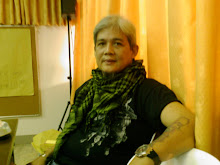The Philippines is multi-lingual and having “Filipino” as the “national language" of the Philippines is purely and simply a figment of our imagination. I belong to the Tagalog ethno-linguistic group and that pseudo-language we call "Filipino" is actually Tagalog. If we make Tagalog in the giuse of “Filipino” as our national language, we undermine and deride the other equally significant Philippine languages like Ilokano, Cebuano, Ilonggo, Pangasinense, Pampango, Bicolano, and others. In the process we get the wrong notion that Tagalog is a better and greater language than the others I just mentioned. Take note, however, that the Philippine languages mentioned are bona fide languages and NOT dialects. In this light, we are faced with the challenge to enrich all the living Philippine ethnic languages.
I maintain that there is actually NO Filipino language. What we call "Filipino" language is really Tagalog. Now if we use Tagalog as the medium of instruction across the board, that's imposing too much of the wrong notion that Tagalog has the preeminence over and above the other Philippine languages (and I am talking of languages, not dialects). Do you think it is fair to impose Tagalog as the medium of instruction in schools in the Ilokano regions? in the Bikol region? in Cebuano-speaking provinces? in Ilongo-speaking provinces? I believe that all of these Philippine languages should be developed and high-quality literary outputs should come out in these languages. I am a Tagalog and I am a passionate advocate of strengthening the literary talents of my fellow Tagalog. With the same passion, I likewise want to see the flourishing of the literary talents of other ethno-linguistic groups.
Without sounding offensive, "Filipino" as it is spoken in total disregard of Tagalog syntax is truly bastardized. But if one would dare say that the Tagalog language is not the language of the learned, I will vehemently react to that, being a member of the Tagalog ethno-linguistic group.
This issue is quite complicated and sensitive because there is really NO language called "Filipino". There are people called Filipinos and they are citizens of the Philiippines. But the Philippines is a MULTI-LINGUAL country. What we know now as "Filipino" is actually Tagalog and Tagalog in the guise of Filipino has been bastardized by non-Tagalog Filipinos who have been guiled and even forced to speak Tagalog as the "Filipino" language. In the process, these people have developed the tendency to treat their own ethnic languages as second-class and less significant than the so-called "Filipino" language. This tendency is counter-developmental because instead of robustly promoting the development of ethnic languages and ethnic literature using ethnic languages, the promotion of "Filipino" as the national language systematically and gradually annihilates these very valuable ethnic Philippine languages in the ocurse of time. Ilokano, Ilonggo, Cebuano, Bikolano, etc. have their own rich literary heritages and if these ethnic languages along with the others are promoted, their literary traditions could have been very rich by now.
Don't get me wrong. In holding this view I don't think I become less nationalistic. Let me cite Cuba as a case in point where the national language--Spanish--is supposed to be a colonial one. But the issue of having Spanish as their national language has never been a nationalism issue. They have mastered Spanish as their common language and they are as united as ever even in fighting the biggest imperialistic power in the world and in having the resolve to survive all the bullying they have been getting from this power for decades.
Subscribe to:
Post Comments (Atom)

No comments:
Post a Comment